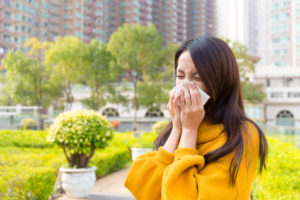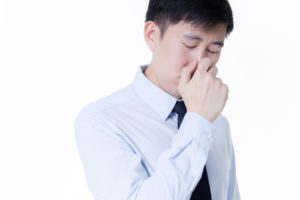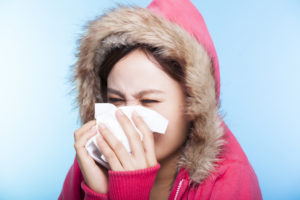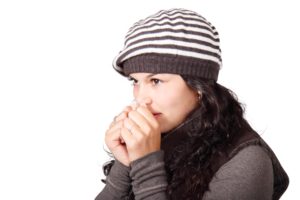Tree Pollen Allergies
 In the Washington, DC, Northern Virginia, and Maryland metropolitan area, tree pollen usually begins to pollinate in mid-February. The pollination is usually dependent upon the weather such that towards the end of Winter, when it first becomes warm outside, pollen begins to be released from the trees. Depending on the temperatures, tree pollination can occur as early as early February or as late as early March. When the trees produce their pollen, allergy sufferers are usually the first to know because they typically will develop symptoms of hay fever (i.e., allergic rhinitis) and/or asthma. As we approach Spring (late March), the tree pollen counts rise and so do the symptoms of individuals with tree pollen allergies. In the Washington, DC metro area, tree pollen counts continue to rise and generally peak in April. This milestone is usually recognized by millions of people as they become aware that all of the cars appear “yellow” in color. The yellowish color of the cars is due to the yellow-colored tree pollen falling on and sticking to the numerous motor vehicles that dominate the DC metro area. The tree pollen count will then decrease and usually end by the end of May. Note that as tree pollination decreases, grass pollination begins. Grass pollen is also a major allergen in many allergic individuals.
In the Washington, DC, Northern Virginia, and Maryland metropolitan area, tree pollen usually begins to pollinate in mid-February. The pollination is usually dependent upon the weather such that towards the end of Winter, when it first becomes warm outside, pollen begins to be released from the trees. Depending on the temperatures, tree pollination can occur as early as early February or as late as early March. When the trees produce their pollen, allergy sufferers are usually the first to know because they typically will develop symptoms of hay fever (i.e., allergic rhinitis) and/or asthma. As we approach Spring (late March), the tree pollen counts rise and so do the symptoms of individuals with tree pollen allergies. In the Washington, DC metro area, tree pollen counts continue to rise and generally peak in April. This milestone is usually recognized by millions of people as they become aware that all of the cars appear “yellow” in color. The yellowish color of the cars is due to the yellow-colored tree pollen falling on and sticking to the numerous motor vehicles that dominate the DC metro area. The tree pollen count will then decrease and usually end by the end of May. Note that as tree pollination decreases, grass pollination begins. Grass pollen is also a major allergen in many allergic individuals.
It is noteworthy to mention that most people in the DC metro area, who are unfamiliar with allergies, think that it is the cherry trees that are causing their allergy symptoms. This fallacy is believed and propagated because people with tree pollen allergies usually feel miserable around the same time that the cherry trees in the Washington, DC area begin to bloom. What most people do not realize is that in general, flowering trees and plants do not cause allergic symptoms for the most part. The reason for this is that individuals who suffer allergy symptoms from tree pollen need to breathe in the pollen in order to develop the typical symptoms of hay fever. The pollen of flowering trees and plants is heavy compared with non-flowering trees. The lighter pollen found on non-flowering trees (e.g., birch, cedar, elm, ash, beech, hickory, maple, oak) are wind-dispersed. These pollens will travel in the air for hundreds of miles sometimes in order to settle on other trees which will cause the trees to continue to reproduce. With flowering trees and plants, since the pollen is heavy, wind will not suffice to spread the pollen. In order to reproduce, the pollen on flowering trees and plants require the aid of bees, hummingbirds, moths, butterflies, beetles, etc. to land on the flowers to help with the cross-pollination. For example, a bee will be attracted to a flower and as it lands on the flower, the tree pollen sticks to its abdomen. When the bee then lands on another flowering tree or plant, the pollen is transferred to that flower and cross-pollination occurs which allows further reproduction. An easy way to think of it is as follows: It is the pollen of the “ugly” trees that are wind-dispersed and thus cause allergies.
The symptoms that individuals generally experience with tree pollen allergies may include one or more of the following: sneezing, runny nose, nasal congestion, post-nasal drip, itchy nose, itchy eyes, watery eyes, redness of the eyes, itchy throat, itchy ears, clogged ears, sinus pressure, headaches, snoring, fatigue, wheezing, chest tightness, coughing, shortness of breath.
The diagnosis of tree pollen allergies can be made by seeing a board certified allergist such as the ones at Black & Kletz Allergy. A comprehensive history and physical examination are obtained and then usually allergy testing is performed in order to identify an allergy to a specific allergen (e.g., tree pollen). Allergy tests can be done by either skin testing or blood testing, although skin testing is generally the preferred method.
Once an individual is diagnosed with tree pollen allergies, avoidance measures are discussed, although the goal of allergy treatment is to allow the person to enjoy their hobbies (e.g., gardening, golf, hiking) rather than being restricted to being indoors for 3 months every Spring. In addition, there are numerous medications that an allergist can prescribe in order to help alleviate the unwanted allergy symptoms of the allergy sufferer. These medications come in the forms of tablets, syrups, nasal sprays, eye drops, lung inhalers, and injections. If an individual has additional allergies such as grasses, weeds, dust mites, molds, pets, etc., then allergy shots (i.e., allergy injections, allergy immunotherapy, allergy desensitization, allergy hyposensitization) may be recommended. Allergy shots are effective in 80-85% of the patients that take them. They have been used in the United States for more than 100 years. They are given to little children as well as older adults. The average person is on allergy shots for 3-5 years.
If you think that you may have tree pollen allergies, or any other type of allergy, the board certified allergists at Black & Kletz Allergy would be happy to help you. We have 3 convenient offices in the DC metro area with office locations in Washington, DC, McLean, VA (Tysons Corner, VA), and Manassas, VA. All of our office offer on-site parking. Our Washington, DC and McLean, VA locations are Metro accessible. There is also a free shuttle that runs between our McLean, VA office and the Spring Hill metro station on the silver line. Please call us for an appointment. Alternatively, you can click Request an Appointment and we will respond to your request within 24 hours by the next business day. The allergists at Black & Kletz Allergy have been treating both adults and children in the Washington, DC metropolitan area for allergies, asthma, sinus disease, and immunologic disorders for more than 50 years. We strive to provide top-of-the-line allergy relief in a caring and professional environment.

 Acute sinusitis may also be referred to as acute rhinosinusitis or more commonly as a classic “sinus infection.” By definition, the symptoms of acute sinusitis will last less than 4 weeks in duration, rather than the 12 weeks or more necessary to characterize a sinus infection as chronic sinusitis or a chronic sinus infection. Of note, some physicians classify a sinus infection that lasts from 4 to 12 weeks as subacute sinusitis. The term recurrent sinusitis refers to repeated acute sinus infections but can easily be confused with a chronic sinus infection. This distinction is particularly important to differentiate as an allergist because the workup and treatment of recurrent sinus infections is quite different than the workup and treatment of a chronic sinus infection.
Acute sinusitis may also be referred to as acute rhinosinusitis or more commonly as a classic “sinus infection.” By definition, the symptoms of acute sinusitis will last less than 4 weeks in duration, rather than the 12 weeks or more necessary to characterize a sinus infection as chronic sinusitis or a chronic sinus infection. Of note, some physicians classify a sinus infection that lasts from 4 to 12 weeks as subacute sinusitis. The term recurrent sinusitis refers to repeated acute sinus infections but can easily be confused with a chronic sinus infection. This distinction is particularly important to differentiate as an allergist because the workup and treatment of recurrent sinus infections is quite different than the workup and treatment of a chronic sinus infection. Nasal polyps (i.e., nasal polyposis) are soft tissue growths that form on the lining of the nasal passages and inside the sinuses (i.e., air-filled cavities within the facial bones). They are painless and non-cancerous. They are usually in the shape of teardrops and characteristically look like glistening moist grapes. Nasal polyps generally develop when the mucus membranes of the nose and/or sinuses are chronically inflamed. This results the tissue to swell up over a prolonged period of time.
Nasal polyps (i.e., nasal polyposis) are soft tissue growths that form on the lining of the nasal passages and inside the sinuses (i.e., air-filled cavities within the facial bones). They are painless and non-cancerous. They are usually in the shape of teardrops and characteristically look like glistening moist grapes. Nasal polyps generally develop when the mucus membranes of the nose and/or sinuses are chronically inflamed. This results the tissue to swell up over a prolonged period of time. In this ever increasing complicated and stressful world that we live in, many individuals find themselves complaining of fatigue. Most people chalk it up to being overworked or to too much stress in their lives, but fatigue can be a symptom of a multitude of illnesses. Amongst these ailments, fatigue is often a symptom of allergies. When an individual suffers from allergies such as
In this ever increasing complicated and stressful world that we live in, many individuals find themselves complaining of fatigue. Most people chalk it up to being overworked or to too much stress in their lives, but fatigue can be a symptom of a multitude of illnesses. Amongst these ailments, fatigue is often a symptom of allergies. When an individual suffers from allergies such as 
 As we approach the Winter in the
As we approach the Winter in the  About 2% of children in the United States are allergic to cow’s milk. The condition usually begins in the first year of life and can affect both breastfed and formula-fed infants. A majority of the children usually “outgrow” the allergy by 5 years of age, however not all children “outgrow” milk allergies.
About 2% of children in the United States are allergic to cow’s milk. The condition usually begins in the first year of life and can affect both breastfed and formula-fed infants. A majority of the children usually “outgrow” the allergy by 5 years of age, however not all children “outgrow” milk allergies.